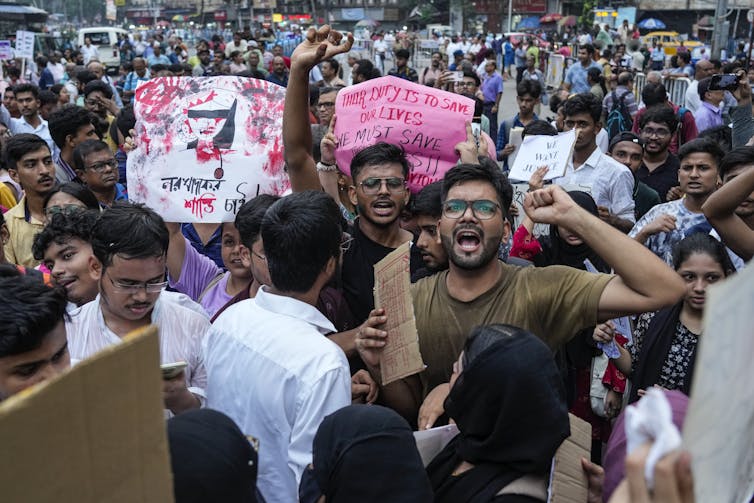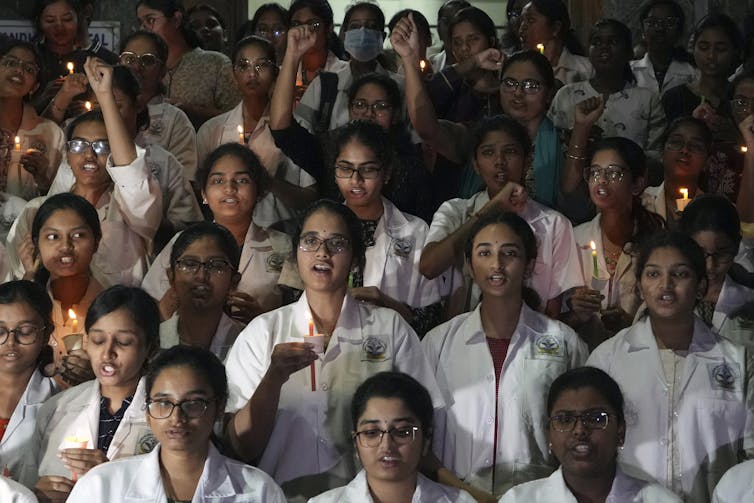Rape and murder of doctor sparks nationwide protests in India

مجلة المذنب نت متابعات عالمية:
The Aug. 9 rape and murder of a 31-year-old post-graduate trainee doctor in a government-run hospital in Kolkata, the capital of West Bengal, has raised alarms about sexual violence against women in India and sparked a string of nation-wide protests.
On the eve of India’s 78th year of Independence from British occupation, protesters of sexual violence against women and girls are asking questions about whether India belongs to its women as much as its men.
While the Indian constitution guarantees fundamental and equal rights to women, especially Articles 14 and 21, the cultural and social aspects of Indian life tell a different story. Indian women are subjected to a culture of silencing and victim-blaming. This culture makes it difficult for victims and survivors of sexual abuse to access legal aid and social support.
Women have to be hyper-vigilant about their safety. Remaining in a perpetual state of vigilance negatively impacts the health outcomes for women and girls.
In response to this week’s murder, doctors at government-run hospitals across the country have started protesting and have called for an indefinite strike. In India, women make up 30 per cent of doctors and 80 per cent of nurses. In Kolkata and its suburbs, thousands have taken part in “Reclaim the night” marches demanding the “independence to live in freedom and without fear.”
Other cities have also joined in this protest. Historically, women’s rights organizations globally have organized take back the night marches to call for eliminating gender-based violence.
According to this week’s postmortem report, the killed medical trainee had a broken collar and pelvic bones and severe genital injury. But despite these clear signs of rape-related physical injury, the hospital administrators at RG Kar Medical College attempted to label the young medical resident’s death as a suicide.
The principal at RG Kar Medical College was reappointed within four hours of his resignation.
(AP Photo/Bikas Das)
Sexual violence is an epidemic
In India, sexual violence and rape are an epidemic, threatening the safety and future lives of women and girls. Rape and sexual violence is normalized because of a culture of impunity, silencing and victim blaming .
In 2022, 90 rapes per day were reported by women. The reality — with the addition of unreported cases — is far more grim.
Just last year, the National Crime Records Bureau (NCRB) declared Kolkata (formerly Calcutta) one of the safest cities for women in India. The brutal rape and murder at RG Kar Medical College indicates otherwise.
This Kolkata rape shows striking parallels with the infamous 2012 Delhi gang rape. That same year, in 2012, another high-profile gang-rape case in Kolkata’s Park Street drew public criticism when Chief Minister Mamata Banerjee first alleged the incident was fabricated.
For Dalit and marginalized women and girls, the situation is even worse.
Between 2015 and 2021, there was a 45 per cent rise in sexual violence crimes against Dalit women. In 2020, four upper-caste men raped a Dalit woman in Uttar Pradesh’s Hathras.
In 2022, a police officer was accused of raping a 13-year-old girl in Uttar Pradesh. The reason the young girl was at the police station was because she had gone to get help and lodge a complaint against some men in her community who had raped her.

(AP Photo/Bikas Das)
A rape culture of impunity?
The cycle of impunity for perpetrators continues because of a lack of political will to protect women and girls.
Law officials participate in covering up crimes and government representatives silence and blame victims.
Despite the efforts of Indian judiciary to establish fast-track special courts to deliver justice to rape victims and survivors, the reality is different. Stigmatization, violence and marginalization present serious road blocks for women and girls to access justice mechanisms.
For instance, perpetrators burnt a survivor to death on her way to attend a court hearing for her rape case.
And it took seven years for the court to deliver justice for the Delhi gang rape case. Many incidents also go unreported because survivors are shamed into remaining silent.
The rape culture in India is a by-product of patriarchy and misogyny that normalizes men’s violence against women. Perpetrators use sexual violence as a way to map their dominance and control over women’s bodies. By exposing young men and boys to ideas that are rooted in the subordination and harmful stereotypes of femininity, toxic masculinity contributes to a culture of aggression, entitlement and violence, enabling men to justify rape as their prerogative.
Next steps
A genuine commitment from the government with a multi-faceted and co-ordinated approach to challenge social attitudes, and deliver timely justice is needed to transform the deeply entrenched rape culture in the country. To do this, there needs to be a significant shift in mindset and action.
This must be accompanied by dedicated policy to sensitize men and boys on consent and dismantling harmful masculine behaviours. What independent India needs to create is a secure and inclusive environment where women and girls have the freedom to exist without the fear of violence, oppression and marginalization. Both national and state government should ensure that there are timely trials, witness protection and counselling services.

(AP Photo/Mahesh Kumar A.)
On the eve of Indian national celebrations for Independence, the irony is that political parties use slogans like “Hail Mother India” Bharat Mata ki Jai to invoke the feminine nature of the nation.
As the case unfolds it remains to be seen if the nation-wide outrage and protests will help to galvanize long overdue changes as well as bring justice to the victim and her family.
نشكركم على قراءة المنشور عبر مجلة المذنب نت, المتخصصة في التداول والعملات الرقمية والمشفرة














